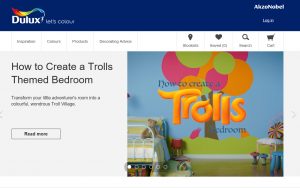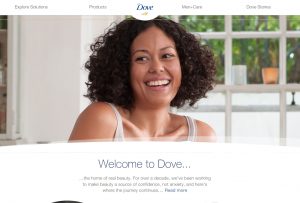
Is your website making an elementary mistake, by being all about you? I’d say 90% of small business websites make this mistake.
It’s understandable. What is your site for, after all, except to describe what you do, who you are, and how to get in touch with you?
Well, in fact, your site might gain a real boost from the marketing wisdom that says that your site should be about someone else altogether. Not you, but your customer.
Sounds obvious, right? But if you look at the language of your site, there’s a high chance you’ll find that it’s all about you and not at all about them.
The purpose of your website
The purpose of your site is NOT to describe you and your business. It is to create a behavioural change in someone else.
The reason you have a website is to help transform someone who is currently thinking ‘no I do not wish to buy your stuff’ into someone who picks up the phone, or walks into your shop, and starts buying your stuff.
Reading your website, your potential customer has three options:
a) Keep sitting happily on their own sofa, and carry on living without your stuff
b) Buy your stuff
c) Buy some different stuff, or similar stuff from someone else
One way to help shift them from (a) to (b), avoiding (c), is to focus your website on THEM.
What’s in it for THEM?
The internet is a cruel world.
Unless this is your mum we’re talking about, then the ONLY reason that people out there are interested in you, your business or your website, is if you can convince them that there’s something in it for them.
You need to paint a picture of a benefit they will receive by getting involved with you.
Explain to them why buying your stuff is going to result in them feeling better.
Hummus
Let’s take an example. Let’s say I’m trying to sell you a pot of hummus. I can describe the hummus:
• It’s a paste made from olive oil and chickpeas and whatnot
• It keeps well in the fridge
• It costs £1.50
• I have been making hummous since 2001
Do you feel like rushing out and buying some yet?
Describing your product doesn’t do much to SELL it
This is the equivalent of you putting information on your site like:
• I offer after school tuition in maths and physics
• I do home visits
• I charge £20 per hour
• I have been a teacher since 1995
In marketing speak, these are ‘features’ of you and the thing you’re selling. This information should definitely be on your website, but it’s not what’s going to SELL you the most effectively.
Nor does detailing the various things you sell
Explaining the products and services you have available, in more detail, again does not do that much to sell them:
- Our hummus comes in original, organic, lemon and coriander, and Moroccan topped
- We use extra virgin olive oil
- It’s made in small batches by hand
Is the equivalent of:
- My coaching is individualised and interactive
- I can provide coaching individually or for groups of up to four students
- I recommend a minimum of eight weeks tuition
This kind of information is useful AFTER I’ve developed some interest in purchasing.
But, for the purposes of initial persuasion and attraction, it’s all a bit ‘so what?’
It’s better to describe the problem you can fix
A step up, is to describe the problem your stuff is going to solve, and to use a more engaging question format:
• Are you feeling peckish? I have a pot of hummus here.
• Is your child falling behind with their maths and physics? I offer after school tuition.
And explain how you can help
How does your stuff address their problem? What are the REASONS they might want your stuff?
• Are you feeling peckish? My hummus is a tasty convenient, economical and healthy lunch.
• Is your child falling behind with their maths and physics? My after school tuition is convenient, flexible, good value for money, and backed by years of experience.
But better is still to tell them why buying your stuff is going to make them FEEL GREAT
But the ultimate is: in what way are they going to feel better?
To galvanise them from being happy as they are, to wanting to buy your stuff, you need to explain the underlying, deeper benefit.
• Are you feeling peckish? Enjoy my delicious hummus. Feel the virtuous glow of eating a good value, healthy lunch. Put your meal together in minutes, so you have time left over to savour your meal, or to use as you choose.
• Is your child falling behind with maths and physics? My after school tuition can work around your schedule. It will give your child a step up in precisely the right areas. You can relax in the knowledge that they are receiving absolutely great quality support, helping them achieve their full potential.
Now, are you feeling any more enthusiastic about my pot of hummus? Hopefully more than with the original ‘it’s a paste made from chickpeas’ approach.
This is the power of emphasising benefits instead of features.
Real world examples
OK, so I just had a surf around for examples. From the biiig companies with biiig marketing departments.
 Dulux’s site doesn’t start with ‘we sell a wide range of paints.’ When I visited, the first item on the page was a totally charming item about how to create a Troll-themed bedroom. “Transform your little adventurer’s bedroom into a colourful, wondrous Troll Village.”
Dulux’s site doesn’t start with ‘we sell a wide range of paints.’ When I visited, the first item on the page was a totally charming item about how to create a Troll-themed bedroom. “Transform your little adventurer’s bedroom into a colourful, wondrous Troll Village.”
Wow. What an amazing picture they’re creating of you and your fantastic child being filled together with joy and wonder! And all you need do to get there is … buy some paint!
 Honda’s site doesn’t kick off with ‘we offer 10 models of car.’ On my visit it showed a gripping picture of an intensely focused young woman, with the slogan ‘Journey to the Extraordinary.’
Honda’s site doesn’t kick off with ‘we offer 10 models of car.’ On my visit it showed a gripping picture of an intensely focused young woman, with the slogan ‘Journey to the Extraordinary.’
A picture and words conjuring up benefits of feeling fast, focused, bold, and glamorous.
 Dove’s site. Well! I’m a bit blown away.
Dove’s site. Well! I’m a bit blown away.
The first paragraph is ‘Welcome to Dove…the home of real beauty. For over a decade, we’ve been working to make beauty a source of confidence, not anxiety, and here’s where the journey continues.’
They definitely don’t start with ‘We sell soap.’
And this marketing magic doesn’t just apply to businesses: here are 8 charity sites that are doing a really good job of this too.
So, how does your site stack up?
Thankfully you don’t need the marketing budget of a multinational to take advantage of this marketing wisdom.
Have a look at your home page. How did you do? How do your competitors’ sites do?
Getting your site to work harder
If you’ve realised your site is all about you, and hardly at all about your customer, don’t panic!
In its own way, this is good news. Re-writing your website may really boost its marketing impact. It can give you more time to run your business, and to enjoy working with all of your customers.
Also, because focusing on features rather than benefits is so common in small businesses, this could help your site stand head and shoulders above your competitors’ sites.
Do get in touch if you’d like some help.
